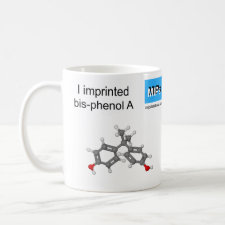
Authors: Brigante TAV, Miranda LFC, de Souza ID, Acquaro VRJr, Queiroz MEC
Article Title: Pipette tip dummy molecularly imprinted solid-phase extraction of Bisphenol A from urine samples and analysis by gas chromatography coupled to mass spectrometry.
Publication date: 2017
Journal: Journal of Chromatography B
Volume: 1067
Page numbers: 25-33.
DOI: 10.1016/j.jchromb.2017.09.038
Alternative URL: http://www.sciencedirect.com/science/article/pii/S1570023217308115
Abstract: Molecularly imprinted polymers (MIPs) were synthesized and used as sorbent for Bisphenol A (BPA) pipette tip solid-phase microextraction from urine samples and BPA analysis by gas chromatography coupled to mass spectrometry (GC-MS). The MIPs were synthesized by the sol-gel methodology. Aminopropyltriethoxysilane (APTES) and tetraethyl orthosilicate (TEOS) were used as functional monomer and cross-linking reagent, respectively. BPA and tetrabromobisphenol A (TBBPA) were evaluated as template during MIP synthesis. The BPA-based MIP displayed slightly higher extraction efficiency than the TBBPA-based dummy molecularly imprinted polymer (DMIP), but the TBBPA-based DMIP was selected as sorbent to minimize interference from leaked template. Comparison of the TBBPA-based DMIP, BPA-based MIP, and non-imprinted polymer (NIP) extraction efficiencies attested that the TBBPA-based DMIP was selective. The synthesized polymers were characterized by Scanning Electron Microscopy (SEM) and Fourier Transform Infrared spectroscopy (FTIR). The TBBPA-based DMIP was reused for over 100 times, which confirmed its robustness. The developed method was linear from 50 to 500 ng mL-1. Precision values had coefficient of variation (CV) ranging from 4 to 14%. The accuracy relative standard deviation values (RSD) varied from -13.6 to 12.3%
Template and target information: bisphenol A, BPA
Author keywords: bisphenol-A, Dummy molecularly imprinted polymer, Pipette tip solid-phase extractions, Gas chromatography-mass spectrometry



Join the Society for Molecular Imprinting

New items RSS feed
Sign-up for e-mail updates:
Choose between receiving an occasional newsletter or more frequent e-mail alerts.
Click here to go to the sign-up page.
Is your name elemental or peptidic? Enter your name and find out by clicking either of the buttons below!
Other products you may like:
 MIPdatabase
MIPdatabase









